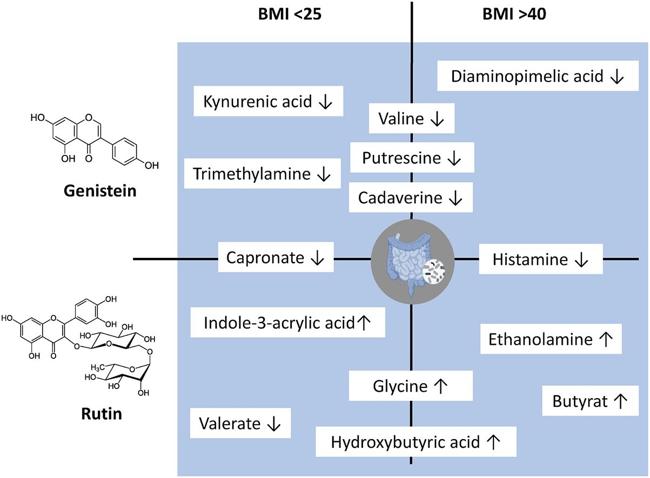Summary
Researchers found that the impact of polyphenols rutin and genistein on the human fecal metabolome varies significantly by body mass index (BMI). Lower BMI individuals showed more diverse metabolic responses,
Source: News-Medical.Net on MSN.com

AI News Q&A (Free Content)
Q1: What is the relationship between polyphenols and obesity, and how does this impact the gut microbiome?
A1: Polyphenols, such as rutin and genistein, are plant compounds known for their antioxidant properties. Research indicates that these compounds affect the gut microbiome differently depending on a person's body mass index (BMI). In individuals with lower BMI, polyphenols have been shown to create a more diverse metabolic response, suggesting that obesity might alter how these compounds are metabolized in the gut, potentially affecting overall health.
Q2: How do polyphenols like rutin and genistein influence the fecal metabolome in individuals with varying BMI?
A2: The fecal metabolome, which refers to the metabolic products found in feces, is significantly impacted by polyphenols such as rutin and genistein. In individuals with a lower BMI, these polyphenols induce a more diverse array of metabolites. This suggests that the metabolic pathways in the gut respond differently to these compounds, potentially offering insights into personalized nutrition and health strategies for individuals with different BMI profiles.
Q3: What are the potential health benefits of rutin and genistein in the context of obesity?
A3: Rutin and genistein are polyphenolic compounds with several potential health benefits. Rutin is known for its antioxidant and anti-hypertensive properties, while genistein has been associated with anti-inflammatory and estrogenic effects. In the context of obesity, these compounds might help modulate metabolic processes and improve gut health, although their exact mechanisms in obese individuals remain an area of ongoing research.
Q4: What recent scientific findings discuss the trophic organization of the human gut microbiome, and how might this relate to polyphenol metabolism?
A4: Recent studies have suggested a multi-level trophic organization within the human gut microbiome, where microbes consume and secrete metabolites in iterative steps. This hierarchical structure can influence how polyphenols like rutin and genistein are metabolized, as the interactions between different microbial species and their metabolic byproducts can affect the availability and transformation of these compounds in the gut.
Q5: How do polyphenols in the diet contribute to a healthy gut microbiome, particularly in individuals with different BMI levels?
A5: Dietary polyphenols contribute to a healthy gut microbiome by promoting microbial diversity and metabolic activity. In individuals with lower BMI, these compounds are more likely to support a diverse range of gut bacteria, which can enhance metabolic health. However, in individuals with higher BMI, the metabolism of polyphenols may be less efficient, potentially reducing their beneficial effects on gut health.
Q6: What are some of the challenges in researching the effects of polyphenols on the gut microbiome in the context of obesity?
A6: Challenges in researching the effects of polyphenols on the gut microbiome include variations in individual gut microbiota composition, differences in dietary intake, and the complexity of metabolic interactions. Additionally, obesity itself alters gut microbiota, making it difficult to isolate the effects of polyphenols. These factors complicate the ability to generalize findings and necessitate personalized approaches in studies.
Q7: What methodologies are employed in the study of human metabolomics to analyze the impact of compounds like rutin and genistein?
A7: Human metabolomics studies employ high-throughput analytical techniques, such as mass spectrometry and nuclear magnetic resonance, to quantify and analyze metabolites. These methodologies enable researchers to investigate the biochemical diversity and mechanisms underlying the effects of compounds like rutin and genistein on human health. Such studies can reveal insights into the metabolic pathways influenced by these polyphenols, particularly in the context of varying BMI and obesity.





